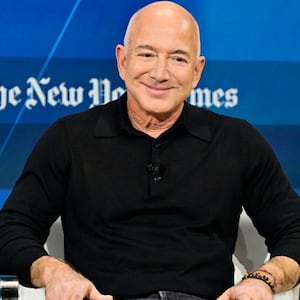Jeff Bezos values the long view, so here’s one: The Washington Post was founded in 1877, and successive generations of writers, editors and executives spent 146 years building its name.
In the past year, Jeff Bezos has done a great deal to imperil it.
Warren Buffett once described The Washington Post’s name as its most valuable asset. That name has—in the eyes of many staff and former readers—taken a number of blows this year, blows inflicted by both Bezos and Will Lewis, the energetic British CEO with a black box past whom Bezos appointed a year ago.

Bezos prevented the paper’s editorial board from endorsing Kamala Harris ahead of the election, causing 250,000 readers to unsubscribe and costing the paper tens of millions in revenue.
It is unclear how many people have unsubscribed since. Executives severely tightened access for employees to view subscriber counts after the news broke, the Beast has learned.
The perma-crisis at the top of The Post is now only set to worsen in the new year, thanks to an improbable figure: Prince Harry.
Next month, on Jan. 13, Harry is finally due to take a long-brewing lawsuit of his to trial. He is suing Rupert Murdoch’s British tabloids for phone hacking—and Will Lewis is a central subject in the case. Lewis played a critical role in “cleaning up the mess” of the scandal for Murdoch, which rocked the British press when it was revealed in 2011.

The impending trial was an undiscussed undercurrent of The New York Times’ DealBook summit held on Dec. 4 in New York, at which both Harry and Bezos spoke.
Phone hacking is an old story, Harry conceded that day. But there is a newer story, he said, one that still remains largely untold: the cover up that followed.
“That’s the thing,” Harry said, “that I think will shock the world.”
Harry’s lawyers have described Lewis as being instrumental in that cover up. Lewis stands accused of deceiving British police, perverting the course of justice and framing a former prime minister, as the Beast reported this summer.
One detective who spoke with the Beast said that Lewis and a junior executive told police “a total fabrication” in 2011 as part of a corporate cover-up to spare Murdoch and his executives.
“It was a poppycock story about why they had deleted millions of emails. We challenged it and asked for evidence for weeks afterwards. It never came. They’d made it up.”

Britain’s errant prince committed to taking the case to trial despite the onerous costs of doing so. He will almost certainly be forced to pay the legal fees of both sides even if he wins damages from Murdoch’s papers, under the onerous incentives of the English court system. (Those incentives have forced all but one of the other 1,300 or so victims of phone hacking to settle out of court.)
Two female editors at The Post have overseen coverage of what Lewis did for Murdoch in the past year. They have now both left the company.
Sally Buzbee, The Post’s former executive editor, left in June after clashing with Lewis over the Post’s reporting of preliminary hearings for the trial in London, during which Lewis was named and accused by Harry’s lawyers. The New York Times reported that Lewis told Buzbee not to cover the case.
This month another senior female editor, Matea Gold, left the paper for The New York Times after being passed over by Lewis to succeed Buzbee, whose replacement he is due to announce before the end of the year. Lewis did not have her interview with Bezos.
(He was forced to withdraw his initial replacement for Buzbee—a British editor from The DailyTelegraph of London, unknown in America and once referred to as “Rat Boy” in the UK—after staff unrest this summer.)
Gold oversaw the coverage of Lewis’ past both under Buzbee and after her departure. Her loss has dismayed staff across The Post. Some of its best known reporters took to X this week to voice their displeasure. The paper’s national editor called it “a profound loss”, with a White House reporter describing Gold as an “incalculable loss”. Another senior reporter called for the Times to “cherish her”, as Lewis did not.

Privately they go even further. “She carried with her the culture of the place,” says one Post editor, “which is about holding the powerful accountable. It looks to people like [Lewis] just wants to take a sledgehammer to [The Post] and make it his own.”
The editor suggested that “nobody has seen him in weeks” in reference to Lewis, whose reluctance to hold an all-hands newsroom meeting has frustrated staff. A source close to Lewis at The Post rejected that characterization, saying: “He’s in the office every day walking around. People see him – His office is glass-walled."
Lewis was arguably a strange choice for The Post. He did edit The Daily Telegraph in London in the 2000s, and served as the CEO of Dow Jones (and publisher of The Wall Street Journal) in the 2010s—two roles which commended him to Bezos.
But neither role was an unqualified success and there were failures too, beside his morally ambiguous role as Murdoch’s bag man over hacking. Bezos poached him from a news start-up that lost $9.5 million in 2023.
The Post itself lost $77m last year, as Lewis made clear in an all-hands meeting with the newsroom in May during which he memorably told staff, “No one is reading your stuff.” (The Post site had 123m monthly visits in November, more than Reuters and The Journal.)
Bezos has never hired a successful publisher at The Post, despite his extraordinary management of Amazon, which has made him the world’s second-richest person.
Lewis’ predecessor, Fred Ryan, ran the paper at arms-length and left the paper deep in the red after a few profitable years during the first Trump presidency. (Bezos has also struggled to pick a successful CEO of Blue Origin, the space company of his long eclipsed by Elon Musk’s SpaceX.)

With Gold gone, Lewis is said to be on the cusp of appointing a New York Times editor to replace Buzbee. That editor, Clifford Levy, currently serves as the deputy publisher of The Times’ sports arm, The Athletic.
Levy, a Princeton graduate who grew up in the New York suburbs and has never lived in Washington, is a quintessential Timesman. He has spent more than 30 years at the paper, serving most notably as Moscow bureau chief, deputy managing editor, and metro editor—earning two Pulitzers, and guiding a reporter to another.
His most relevant experience for Bezos and Lewis may have been as The Times’ point man during protracted negotiations with the paper’s union in recent years.
Levy faced fire from Times colleagues during that fight, with one reporter saying to him: “Cliff, what the [Times] has done to your reputation breaks my heart. And it should break your heart. I feel really bad that these negotiations have turned a man who built his career on trust into a liar.”
The Post is set to have a fractious relationship with staff in 2025, having demanded that employees return to the office full time next year. The paper’s guild has voiced lengthy objections to the policy. Lewis responded by inviting reluctant staff to resign.
One Post reporter derided Levy in unflattering terms to the Beast over his labor battles at The Times, although they added that he “at least seems to have relevant experience and credentials” and is not “closely tied to Will.”
That alone, they said, would be a step up from Matt Murray, the paper’s current interim executive editor, whom they described as an “utterly uninspiring” lackey for Lewis. The Post declined to comment on the characterization.
Next week Bezos will decamp to Mar-a-Lago to pay court to Trump, with Amazon donating $1m to the president-elect’s inauguration on Jan. 20.
Washington’s attention will be focused that day on the presidential change of guard. Will Lewis’ thoughts may well be in London, where Harry’s trial against Murdoch will—if it goes ahead—be entering its second week.
By that point the court’s focus may have turned to the supposedly crucial role Lewis played in an alleged corporate cover up that Harry expects to shock the world.








